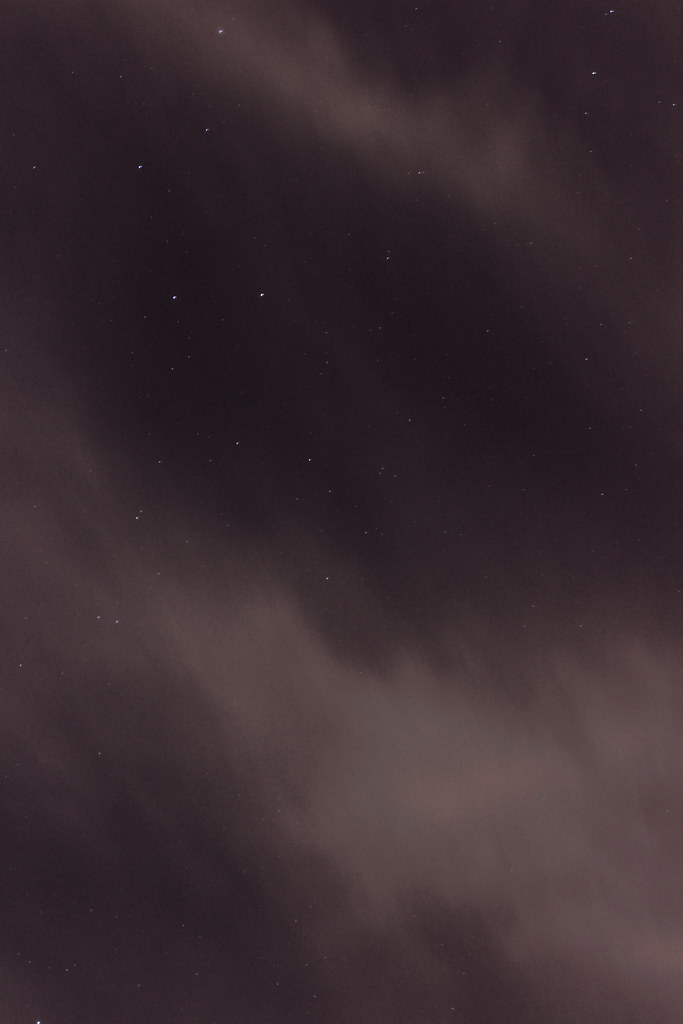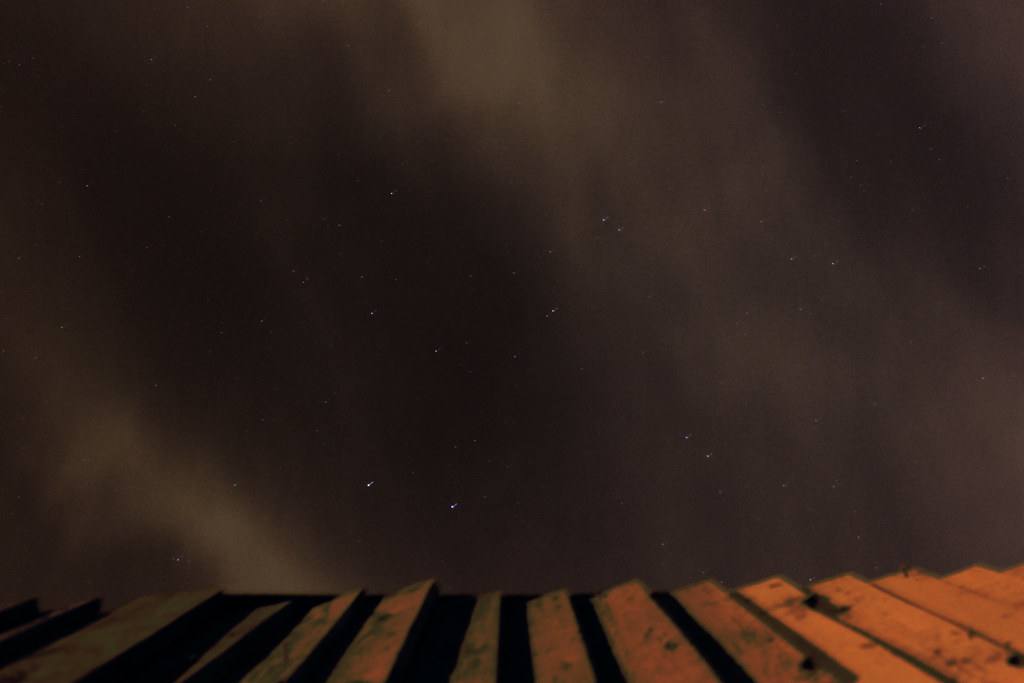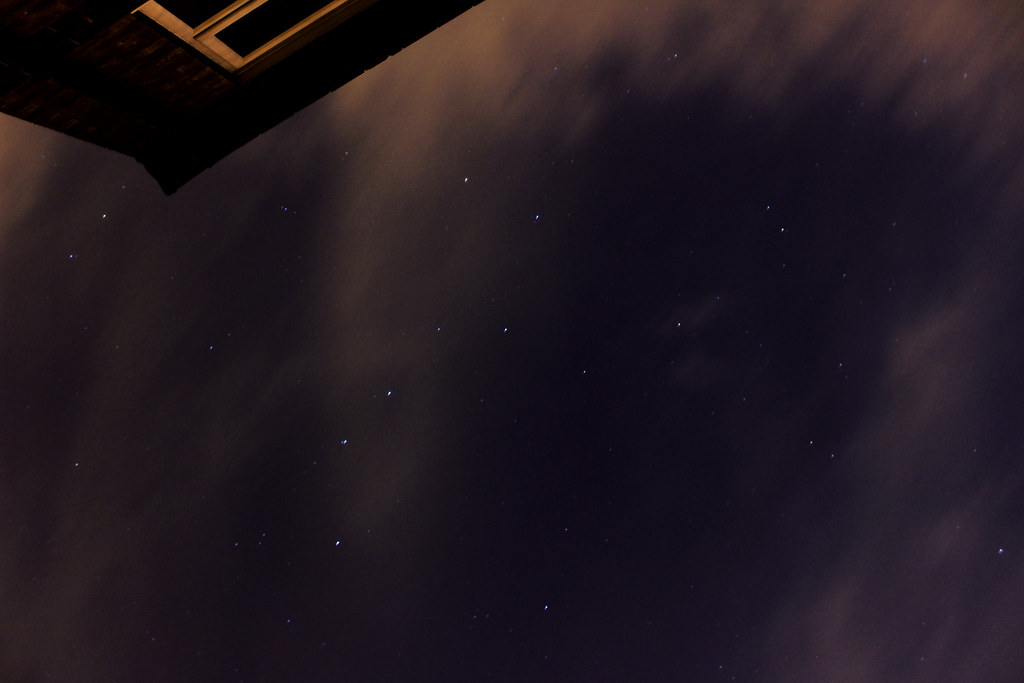Topic: Astrophotography
Are any of you guys into astrophotography? I had my first stab at it earlier and the results weren't too bad.



If you have any shots of your own, put 'em up!
You are not logged in. Please login or register.
Are any of you guys into astrophotography? I had my first stab at it earlier and the results weren't too bad.



If you have any shots of your own, put 'em up!
One of my 2012 resolutions is to get marginally competent at astrophotography. What's your setup?
I took a shot of the moon with a 200mm zoom lens if it counts?
One of my 2012 resolutions is to get marginally competent at astrophotography. What's your setup?
All I used for those was my 600D (T3i) laid on the ground with exposures of 30 seconds. I would have used a tripod, but I lost my baseplate.
I took some pics of the moon during the 2010 winter solstice total eclipse. They're not great but I think they're cool.

2:42 am

3:09 am
There more on FB, but I think these are the best.

I HEARTILY APPROVE OF THIS THREAD AND REQUIRE MORE PICTURES OF SPACE
Okay, since Teague is pushing it, I'm contributing now. I'm going to take a little look back on my "career" in astrophotography; this is why the first shots are going to look quite bad. When I started, I knew about nothing in technique, both in processing and in photography.
I've always been in love with the stars. But I really started calling it a passion when I was around 15. I started reading magazines, looking at the sky and trying to identify the planets, the brightest stars, constellations and stuff.
And since I was also into photography, I eventually began to take pictures of the stars, with an Olympus bridge camera on a shitty tripod.
But it really took off when my father gave me his telescope - an almost brand new Meade LX90 :

He had never managed to understand how that thing worked, and figured I would have better use for it. The old man was damn right. Every time I could, I would get the telescope out in the garden and look at nebulæ, galaxies, star clusters, planets, etc.
Since then, I've spent time to understand how astrophotography really worked. It is a difficult thing, even more demanding than traditional photography. It takes time, money, and technique - a lot of each. There are two dimensions of equal size in astrophotography : taking shots, and processing them.
Thus, in a year and a half, I've produced very few pictures I can say I'm proud of. In such a field, you must learn to be very, very patient. Plus, my telescope stays at my parents' house, and I'm away most of the year for studies.
I'm not gonna show every single picture I've made so far. There are some images that don't grow old well, as my knowledge wasn't so advanced then.
Here's my very first actual shot made with the telescope (July 2010), and my previous reflex camera, a Sony A100 (boy don't I miss it) :
Jupiter and its four galilean satellites. This is actually the most I could get from the planet with my camera. There are other imaging techniques better suited for this.
A pic of the Moon :
September 2010, I tried deep space for the first time; shot one of the two star clusters in the constellation of Perseus.
The following January, I shot a classic in astrophotography : the Orion Nebula.
Colors are all wrong; there are some post-processings things I didn't know back then. Not to mention the awful noise. But you should have seen my face when i discovered on my APN rear screen all this gas and stars I had managed to capture.
Summer 2011, I got to work in an astronomy center (observation nights and stuff). Here's a star trail picture I made in the observatory there :
And finally, during last Christmas holidays, I took the best shot I think I've made so far : a wide field shot of the constellation of Orion. This is also the first astrophotography picture I've made with my Canon 60D (and I also opened a Flickr account, feel free to follow it; I would be really interested in following yours if you have one)
For many reasons, this picture doesn't show as much as it should have for me. But I'm still proud of it, and I think I'm now entering a new level into astrophotography. I spent the last year and a half learning theory, and practice is finally starting to pay off. This is exciting.
Other random stuff :
The Moon during the total eclipse last June :
The Moon and Venus last December :
To be honest, there are so many more things I wish I could show you guys. Most of all, planet shots. I've been trying for months to get good pictures of Jupiter or Saturn (and I mean, close pictures, with the planet rings and all), but this is a whole other field and technique.
Right now, I'm about to sell my telescope. I've grown frustrated with it, because it's not suited for astrophotographers. When I buy my new setup, things are going to get serious. I just can't fucking wait.
Sorry for the big reply, but you guys asked for it! It could be interesting to talk about technique and stuff. Feel free to ask if you have questions, I'me not a pro but I'm starting to know some things about astrophtogoraphy.
Last edited by Saniss (2012-06-30 01:23:58)
Fucking awesome.
Those are some amazing photos.....enchanting!!
@Saniss.....the Orion Nebula looks awesome. Can't wait to see what you'll achieve with a new setup.
Definitely something I'd like to do, awesome photos.

Shot of the moon the other night handheld 550d
Spaaaaaace! This would be a fun thing to get into, never considered it before. Those shots are great. Would it be possible to set up a motion control rig, really low RPM motor or something for long exposure that counteracts the earth's rotation to get long exposure of the night sky without star trails?
PRE-EDIT: Just looked it up and it's called an equatorial tracking mount. And they're kind of expensive. Balls. Oh man, if you did a time lapse with one of those the horizon would spin around the frame.
Last edited by paulou (2012-01-17 21:57:49)
Yep, that's the most basic "tool" you need to get started in long exposure astrophotography. And if you want to shoot for like ten minutes without any trail, it won't be enough. With great focal lengths, after several minutes of shooting, you'll realize even the most expensive mount isn't perfect: periodic errors and stuff like this.
You're gonna need to set up a camera following a single star on an additional telescope and sending orders to the mount's motors to correct those errors. See what I meant by expensive field now?
Thanks, guys. That means a lot to me.
Hopefully, if everything goes as it should, I'll order my new setup next month. My dream for a first shot with it would be the Orion Nebula once again, but we're getting close to the end of its visibility period. I might have to wait until next winter.
Wicked shots Saniss. I may get inspired enough to process the milky way pano I took last summer. T2i and a tripods all I've been using, but I have a t-mount for my 4" reflector, but it works best under daylight.
Truly beautiful shots so far. I am genuinely inspired.
Saniss! Those are gorgeous!
I wonder how easy a DIY equitorial tracking mount would be. Probably one of those things that seems easy in theory, but impossible to actually get to work. I'm thinking some sort of spinning platform (aligned to polaris?), that spins based on one of those clock-building kits, with a 1/24 gear ratio thing going on in there somewhere. That'd work, right?
I've got some shots I snagged during the Perseids meteor shower a year back- I should see if I copied em to this computer.
What you described would probably work. There are two elements that need to be taken under great consideration though :
- the "quality" of the motors. Autoguiding is always the solution for long exposure, but it won't save motors with too much periodic errors. You can imagine such an equipment needs some precision to be efficient.
- balance. Your setup must be perfectly balanced with counterweights and stuff in order to work properly. Otherwise you'll lose efficiency and it will kill the motors.
I've seen several DIY equatorial mounts on the web; google it, you'll probably find useful information about all this.
Thanks for the comment!
Last edited by Saniss (2012-01-21 02:09:33)
Shot of the "supermoon" tonight, Canon T3i, tripod.

Damn, Super Moon is behind the clouds here. 
Thanks for the pic!

I've taken a few shots of the night sky and the moon, but I can't even begin to compete with telescopes.
Powered by PunBB, supported by Informer Technologies, Inc.
Currently installed 9 official extensions. Copyright © 2003–2009 PunBB.